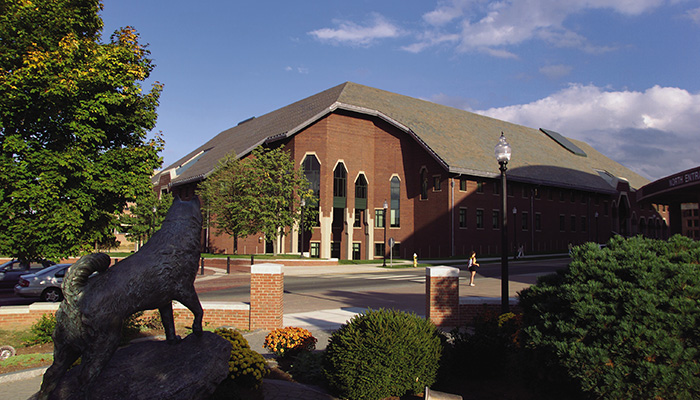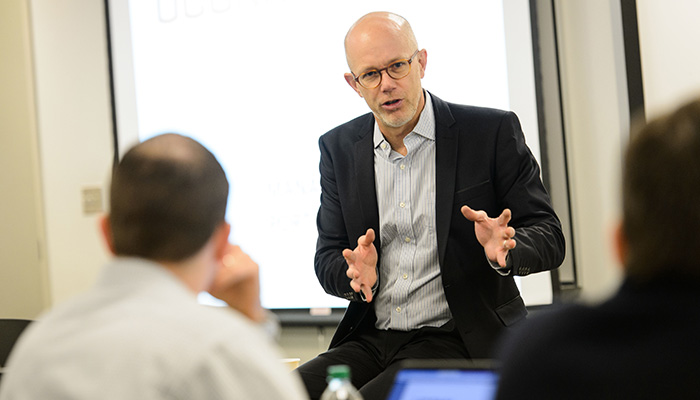Mission
As part of a research-focused public university, the UConn School of Business has a mandate to engage our faculty, staff, students, alumni, and community partners in activities to transform lives and the surrounding world, including:
- Educating the next generation of business professionals
- Discovering the next generation of business insights
- Attracting the next generation of business talent
- Supporting the next generation of Connecticut businesses
In fulfilling this broad mandate, we emphasize activities that feature innovative thinking and community engagement.
Vision
To be a sustainable business school at a public research university, recognized nationally for innovative research and teaching excellence, and recognized locally for student and faculty engagement with business and community partners. Our longstanding traditions provide the foundation to achieve this vision.
Goals
We pursue continuous improvement on specifics of our vision:
1. Sustainable business school at a public research university
- Educational sustainability: attract great students and outstanding faculty thought leaders by combining our external reputation with a supportive internal culture.
- Financial sustainability: generate revenue streams to support our mission – including tuition, fees, state support, business partnerships, and philanthropy – and rely on faculty and staff to steward our scarce resources.
- Community sustainability: minimize our environmental impact, foster diversity, and maximize student, faculty, and staff efforts to meet social needs in conjunction with the business and non-profit communities.
2. Recognized nationally for research and teaching excellence
- Academic programs: demonstrate teaching excellence through rankings similar to other public research-focused business schools.
- Faculty departments: demonstrate research excellence among the top 25 public business schools in per-capita output at top research journals.
- Staff leaders: support high levels of student satisfaction with both academic and non-academic content.
3. Recognized locally for student and faculty engagement with business and community partners
- Students and alumni: prepared for successful business careers across industries, and connected to employers in and near Connecticut.
- Business and community leaders: perceive our faculty as thought leaders on relevant topics and our students as important talent.
- Entrepreneurs across the university: engage with our students, faculty, and staff on core business topics to create new ideas, jobs, businesses, and industries.
Major Challenges
Achieving our vision requires overcoming several emerging roadblocks:
- Declining public financial support for higher education
- Public doubts about the importance of a four-year degree
- Increasing cost pressures and reliance on graduate student fees that may vary with the economy
- Conflict between desire for low cost and high quality
- Negative demographic trends in the US and especially the Northeast
- Geopolitical uncertainty, especially the ability for prospective international students to travel and obtain appropriate visas to study and begin their careers in the US
Current Situation
Fulfilling our mission, the UConn School of Business is recognized as a leader among public research institutions. Per-capita faculty research productivity in all of our departments ranks among the top 75 universities, with some departments consistently among the top 25. New faculty are consistently recruited with elite credentials, and the School applies high standards for promotions and the award of tenure. Over the past five years, the School’s increased commitment to offering compensation packages competitive with other top business schools has made it easier to attract and retain this top talent. In exchange, junior faculty have not had their contracts renewed unless they were performing at comparable standards. Among senior faculty, we have been successful in all seven instances when we wanted to retain faculty members who had received competitive offers from other institutions.
Rankings for our educational programs are similar. Undergraduate programs consistently rank among the top 75 US institutions and among the top 25 public universities for undergraduate business education, and we have seen increases in both the quantity and quality of students seeking our undergraduate degrees. The full-time MBA program ranks from 45th to 85th depending on the year and the rankings source. Our specialty Master’s programs rank among the top 20 programs in their specialties. Finally, our part-time and Executive MBA programs serve existing employees in the Hartford, Stamford, and Waterbury markets and have grown steadily over the past five years while simultaneously increasing student quality. All of this growth has been achieved with modest expansion of full-time faculty. We adjust all of these programs regularly to meet the evolving needs of the business community.
Our endowment and annual philanthropic activity lags behind many other leading business schools, and it has been a priority to increase our engagement with alumni and local business leaders. UConn’s stature has risen steadily over the past 30 years, and we are just now starting to have a sizable number of alumni who have achieved sufficient career success to make major contributions to the School. We have a strong partnership with the UConn Foundation and have begun an annual Giving Day that will help instill a culture of giving amongst today’s students. It is a priority to extend this culture to our alumni and the Dean’s Advisory Cabinet provides significant value in helping us determine how to best engage the potential donors in the group. For 2020 our fundraising in the business school reached a new high of $8.5 million.
We face many of the same challenges as other business schools. Financial contributions to the Business School from the University have declined 3-4% per year even as the undergraduate student population has increased more than 5% per year. This reflects budget constraints at the state level, and to date we have been able to offset the reduced support with increased revenue from our fee-based Master’s programs, along with enhanced efficiency in managing class sizes by sharing courses across campuses. However, these programs serve a high percentage of international students and national politics have made the US a less appealing place to pursue graduate education. Even though UConn’s programs overall have not experienced a significant decline in international applications or matriculations in recent years, for Fall 2020 we are seeing significant declines in MSFRM and MSBAPM. Our response has been to schedule many students for delayed arrival in January of 2021 or Fall 2021. Much will depend on national access to testing (GMAT and TOEFL) and opening of embassy access to visas. Visas are important not only for student status but also for future employment in the USA via both training access and also green card opportunity.
Strategic Priorities for the 2020s
We experienced high student growth in our graduate programs from 2013 to 2018 and now consider most of these programs near full capacity. Going forward, we seek to pursue niche “smart growth” opportunities (e.g., the recent increase in online course delivery has accelerated our capacity to deliver a fully-online MBA and we have begun development of this program). At the undergraduate level, we are willing to continue growing organically as long as we can maintain current standards of student quality. Following the “one university” philosophy of our central administration, our top strategic priority for the undergraduate program is to enhance the offerings and delivery at regional campuses to provide a consistent experience with that of students at the main campus in Storrs.
As a result, our current strategy emphasizes focus rather than expansion. We are currently in the process of enhancing our program offerings and coordinating our research activities in three areas that have high current relevance, future potential, and fit with University priorities and our geographic position:
1. Entrepreneurship and economic development. For many years, the UConn School of Business has been deeply committed to entrepreneurship research and education. We have had the Wolff Chair for Strategic Entrepreneurship and the Wolff Business Plan Competition since the mid-1990s, the Connecticut Center for Entrepreneurship and Innovation (CCEI) since the mid-2000s, the Innovation Quest program since the early 2010s, and we are frequent collaborators with the University’s Werth Institute for Entrepreneurship and Innovation established in 2018.
CCEI has actively supported the development of businesses led by UConn students or faculty from departments across campus, in addition to providing enhanced educational experiences for business and non-business students alike. The University’s current leadership has indicated a strong commitment to being an engine of economic growth for Connecticut and we expect CCEI and other School of Business initiatives to continue playing a major role in this area.
2. Business & society. The UConn School of Business has scholars across all its departments who are intellectual leaders on the topics of corporate short-termism, business and human rights, corporate social responsibility, sustainable supply chain management, socially responsible investing, and related topics. Each of these topics has a distinct intellectual heritage, but they also share the common theme of trying to understand the decisions, practices, and infrastructure necessary to make business organizations sustainable for the long term – i.e., to profitably serve customers without compromising community or environmental well-being.
Given the timeliness of these topics in both academic research and corporate practice, along with the established expertise of our current faculty, we consider this a high-priority area. At present, three activities are underway to help organize and amplify our commitment to this topic.
- First, we are searching to add a research scholar with an emphasis on human rights initiatives on a school-wide basis (i.e., the scholar will be assigned to the relevant department after being identified rather than limiting the search to a pre-defined department).
- Second, we are soliciting philanthropic support to develop a research center at UConn that can support and publicize research in Business and Society, broadly defined to include societally relevant research from all five departments.
- Third, we are adjusting our Full-time MBA program to emphasize “civic sustainability” as an area of emphasis. Our urban location in Hartford provides us with the ability to connect students to opportunities to improve the sustainability of inner cities, and we have observed that our students, faculty, and staff often pursue these opportunities on their own. By organizing and promoting this work, we can increasingly attract students who share an emphasis on this mission.
The Business School leads the Business & Human Rights Initiative of the Human Rights Institute, and actively partners with the University-level Sustainability Institute and Humanities Institute.
3. Fintech. The developing area of Fintech is a natural fit for the existing programs at UConn and the corporate partners in our local region. Encompassing Insurtech and Medtech as well as applications for hedge funds and cryptocurrency, a strong Fintech curriculum can be built on a foundation that combines elements of our successful Business Analytics and Project Management and Financial Risk Management programs.
With existing faculty expertise in this area and strong access to local professionals who can educate students about the rapidly-evolving application of financial technologies, the UConn School of Business is well positioned to design and deliver the additional courses that will round out a robust Fintech curriculum. Moreover, the concentration of insurance headquarters in Hartford and hedge funds based near Stamford makes UConn an ideal school from which students can obtain internships and post-degree employment. We have started a support fund for this initiative at the UConn Foundation, will begin piloting coursework in the Fall of 2020, and aim to enroll a cohort of approximately 40 graduate students focused on Fintech in the Fall of 2021. Such an effort will also allow us to provide some Fintech coursework to interested students in other programs, including undergraduates.









